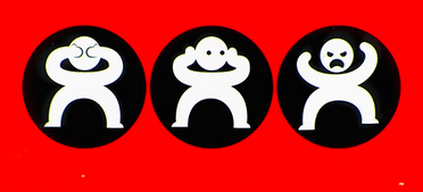Rosie Cann
From the get-go the cast are energetic, almost frantic, and bring us right into the world of the play without pandering or apology. Get in the car, we’re going. At times lines were lost and I think that the comprehension of these opening segments would be helped by a slight slowing of delivery, but the velocity of the piece is incredible. The dynamic stage-pictures and transitions give a fresh TV-feel to the sequence. This energy and the intense physicality make a wonderful marriage, giving humour and clarity to the identities of different characters and teams, as well as providing a somewhat accidentally poignant statement on the separation of texting from real life communication. 'No good' is an emoticon that I will be incorporating into my vocabulary immediately.
In this manner, this cast is strong beyond comment. With a lesser focused or less capable cast, this show would be a shambles, but with them (them being Andy Gartrell, Adeline Shaddy, Maria Williams, Comfrey Sanders, William Duignan and Lewis McLeod) it flys, and the altitude is dizzying but marvellous.
As we begin to get to know characters throughout the piece this velocity drops away and we are allowed to breathe in a few heightened, emotive moments of stillness. As an inconsequential tidbit, this show has one of the most realistic sex-snippets I've ever seen in theatre. On a more consequential note, it is a credit to the strength of the writing and the actors alike that some refreshingly “unconventional” moments held this space so beautifully. For example, a striking moment of female friendship and women supporting and forgiving each other between Comfrey Sanders and Maria Williams is a highlight of the show. Another wonderful moment is that of romantic, kind flirtation, between William Duignan and Lewis McLeod - at last, a beautifully developed and genuine homosexual flirtation that doesn’t buy into cliche! The major "break-up" of the show being between two male friends was also delightful for this same reason, and because, well, the actors were brilliant.
As a new play, I hope it is useful to talk about the writing beyond the production, with a look to future shows. As such I would like to congratulate Adam Goodall on these moments of (dare I say feminist) victory! I’d also like to note the crafted interplay of technically informative sections, character and story sections, and musical or dance related segways, the structure at play was well-developed and joyful. This being said, the world of the debater is a confusing and insulated one from the public, and although I appreciate the apparent authenticity and the respect for the audience’s intelligence, I think Goodall strays towards expecting slightly too much of us, and the multiple narratives at the beginning are befuddling at times. The connection we have with the characters later in the piece is genuine and engaged, and we may be able to reach that point quicker with a simplification of the opening.
Credit must also be laid at the feet of Sound Designer Flinn Gendall for the ease of pacing and transition provided by the excellent soundtrack, which also gave the piece a filmic quality not often seen in Wellington theatre. The set needs a similar nod of the cap, Lucas Neal created an appropriately energetic and supportive (and thus importantly at no point distracting) set which framed the piece in a lovely manner. Tony Black, quickly becoming relied upon in the Wellington theatre scene as a ruddy-good-sort and brilliant lighting designer to boot, has nailed it once again, although as a front-rower I was occasionally a little too lit myself. Such is the life of an enthusiast.
But while bathed in the literal and figurative light of this show, I giggled, I guffawed, and I was a little bit touched too. Point of information: Catch this show while you can, and keep an eye on Making Friends Collective, for good reasons and because... well... they might knife you.






